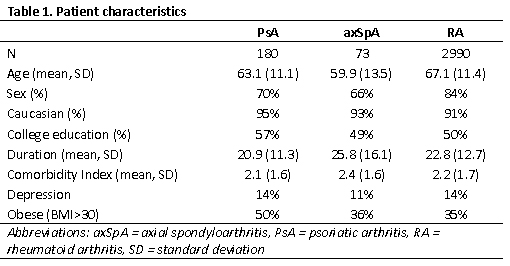Session Information
Date: Friday, November 6, 2020
Title: Patient Outcomes, Preferences, & Attitudes Poster I: RA, Spondyloarthritis, & OA
Session Type: Poster Session A
Session Time: 9:00AM-11:00AM
Background/Purpose: The Patient-Reported Outcome Measure Information System (PROMIS) includes a set of instruments developed to measure physical, mental and social health. PROMIS measures have been studied in RA but have only recently been used in spondyloarthritis. In this study, we aimed to determine whether there are differences in five PROMIS measures across psoriatic arthritis (PsA), axial spondyloarthritis (axSpA) and rheumatoid arthritis (RA) that would affect differential use in these diseases.
Methods: A cross-sectional study was performed in the Forward database utilizing data from 2019 among patients who had PsA, axSpA or RA and completed at least one PROMIS measure (4-item short forms of PROMIS physical function, fatigue, pain interference, sleep disturbance, and ability to participate in social roles and activities). Score distributions were examined (not shown) and floor and ceiling effects calculated. Differences in mean scores by disease were tested using Kruskal Wallis tests. Differences in scores among patients reporting an acceptable health status (current health status of excellent or good) compared to those rating health status as fair or poor were tested using student’s t-tests. Differences in scores by potential contextual factors (age, sex, obesity and depression) were examined using standardized differences. We hypothesized that score distributions, floor and ceiling effects, discrimination between acceptable and not acceptable health status, and the impact of contextual factors on scores would be similar among the three diseases.
Results: In 2019, 3,243 patients completed the PROMIS29: 180 with PsA, 73 with axSpA and 2,990 with RA. Mean age was 63, 60, and 67 for PsA, axSpA, and RA respectively, and generally patients were more likely to be female, Caucasian and have long disease duration (Table 1). 63%, 60%, and 60% respectively rated themselves as having good or excellent health at the time of survey completion. Score distributions were similar across the three diseases. Mean scores for each instrument are shown in Table 2. Patients with PsA reported on average lower physical function compared to RA and axSpA (p=0.04), however there were not significant differences by disease for fatigue, pain interference, sleep disturbance, or social satisfaction (p >0.05). Patients with an acceptable health status had better scores than those not in an acceptable state, and these differences were statistically significant for all instruments across all three diseases. Finally, contextual factors had an impact on the scores but the association between baseline characteristics and scores differed by disease (Table 3). For example, obese patients had worse physical function in all three diseases but impact on the other four measures was greater in PsA compared to axSpA. Similarly, depression had a significant effect on all scores but was particularly associated with worse fatigue in PsA and RA.
Conclusion: The PROMIS measures tested have similar score distributions and discrimination in PsA, axSpA and RA suggesting that they can be used across inflammatory arthritis. However, contextual factors may have differential influence on the scores in these three diseases.
 Table 1. Patient characteristics
Table 1. Patient characteristics
 Table 2. Mean scores by disease
Table 2. Mean scores by disease
 Table 3. Standardized differences* by contextual factors
Table 3. Standardized differences* by contextual factors
To cite this abstract in AMA style:
Ogdie A, Michaud K, Hwang M, Pedro S, Katz P. Use of PROMIS29 Across Inflammatory Arthritis: Score Distributions and Impact of Contextual Factors [abstract]. Arthritis Rheumatol. 2020; 72 (suppl 10). https://acrabstracts.org/abstract/use-of-promis29-across-inflammatory-arthritis-score-distributions-and-impact-of-contextual-factors/. Accessed .« Back to ACR Convergence 2020
ACR Meeting Abstracts - https://acrabstracts.org/abstract/use-of-promis29-across-inflammatory-arthritis-score-distributions-and-impact-of-contextual-factors/
